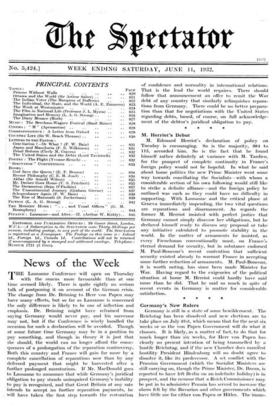M. Herriors Dant M. Edouard Herriot's declaration of policy on
Tuesday is encouraging. So is the majority, 884 to 115, accorded him. So is the fact that he found himself rather definitely at variance with M. Tardieu, for the prospect of complete continuity in France's foreign policy would not be hopeful. In what he said about home politics the new Prime Minister went some way towards conciliating the Socialists—with whom a considerable section of his own following would still like to strike a definite alliance—and the foreign policy he outlined was such as they could have no difficulty in supporting. With Lausanne and the critical phase at Geneva immediately impending, the two vital questions are reparations and disarmament. As regards the former M. Herriot insisted with perfect justice that Germany cannot simply disavow her obligations, but he declared himself ready to discuss any proposal or take any initiative calculated to promote stability in the world. In the matter of armaments he insisted, as every Frenchman conventionally must, on France's eternal demand for security, but in substance endorsed M. Paul-Boncour's recent contention that sufficient Security existed already to warrant France in accepting some further reduction of armaments. M. Paul-Boneour, it is worth noting, has since been made Minister for War. Having regard to the exigencies of the political situation at home M. Herriot could hardly have said More than he did. That he said so much in spite of recent events in Germany is matter for considerable satisfaction.
* *


































